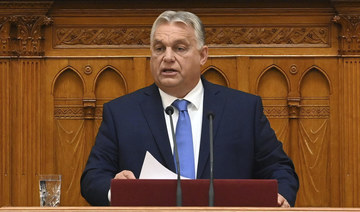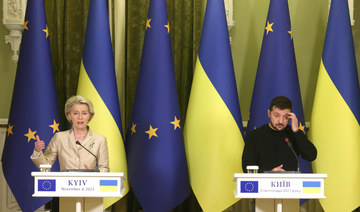NEW YORK CITY: At the United Nations headquarters in New York, it was a moment of reckoning.
The COVID-19 pandemic is not only the greatest global health crisis since the creation of the United Nations 75 years ago. It has also engendered severe humanitarian, socio-economic, security and human rights crises.
“None of us could have imagined, this time last year, what was to come,” UN General Assembly President Volkan Bozkir said on Tuesday at a two-day UN special session on the COVID-19 pandemic.
“This crisis compels us to shake up how things are done, (and) to restore confidence and trust in the United Nations.”
The special session came at a critical time when, according to data from the World Health Organization (WHO), the pandemic has claimed more than 1.4 million lives, infected more than 64 million people, decimated the livelihoods of millions more all over the globe, and could lead to the worst global recession since the Great Depression.
With the world economy in decline and millions of jobs lost, extreme poverty is expected to rise, and the global efforts towards achieving the UN Sustainable Development Goals (SDGs) — designed to eliminate hunger and malnutrition by 2030 — could be further hampered.
With entire continents experiencing a resurgence in cases, world leaders, UN principals and other stakeholders shared their experiences living and managing the impact and consequences of COVID-19, while calling for the need to forge a coordinated path forward.
Although the entire planet is facing this common threat, UN Secretary General Antonio Guterres pointed out that it is the most vulnerable — such as the poor, older people, as well as women and girls — who have been hit hardest.
Guterres said some of this fallout is the result of long-standing vulnerabilities, inequalities and injustices which the crisis has only exposed.
He lamented that the WHO’s scientific guidance for a coordinated global response was largely ignored: “And when countries go in their own direction, the virus goes in every direction,” he said.
UNDP Administrator Achim Steiner called 2020 a vital year in trying to prove why the world needs the UN, and lamented that the response as a collective international community is not commensurate with the extent of the scourge.
“It is extremely expensive to be poor in a pandemic, whether you are a household, or a less developed country, or a business person who is about to lose everything you have worked for all your life,” Steiner said.
“Poverty is existential in a pandemic” seconded Melissa Fleming, UN Under-Secretary-General for Global Communications Melissa Fleming who moderated the panel.
A recent UNDP report found that 1 billion people will be living in extreme poverty in 2030 if their situation is not rectified now.
Under a “High Damage” scenario, the report anticipates that 80 percent of the COVID-induced economic crisis would persist in 10 years’ time due to loss in productivity, preventing a full recovery to the pre-pandemic growth path.
However, said Steiner, “as this new poverty research highlights, the COVID-19 pandemic is a tipping point, and the choices leaders take now could take the world in very different directions. We have an opportunity to invest in a decade of action that not only helps people to recover from COVID-19, but that re-sets the development path of people and planet towards a more fair, resilient and green future.”
While the UN managed to “avoid major famines” this year, Mark Lowcock, Under-Secretary-General for Humanitarian Affairs and Emergency Relief Coordinator, warned of a possible 40% increase in people who will not be able to survive next year without aid, with human development index falling and, along with it, life expectancy.
Beyond health, Guterres has also echoed his appeal for a global cease-fire so that countries can focus on fighting the virus, urging “new efforts and commitments to silence the guns by the end of the year.”
He also called for “peace within the home” to counter violence against women and girls. Describing violence against women and girls as “a horrible plague,” Lowcock also pointed to the “evident deterioration” of the behavior of men toward women and girls: “All the frustration and stress are being taken out against women in a shocking way across the planet.”
Participants also unanimously called for potential COVID-19 vaccines to be a global public good “available to everyone, everywhere,” while Guterres warned that a global mechanism which would make this possible remains underfunded.
Equitable access to vaccines is integral to effective pandemic response, said Azerbaijan’s President, Ilham Aliyev, speaking on behalf of the 120 countries of the Non-Aligned Movement.
“As many vaccines against COVID-19 are being currently studied, we are all looking forward to the successful outcome of clinical trials and hope that a safe and effective vaccine will soon be available, and that they will be considered as global public goods ensuring their universal distribution at affordable prices for all”, Aliyev said in a pre-recorded video message.
Bozkir, the General Assembly President, expressed the feelings of millions worldwide, who are dreaming of the day the pandemic is declared over: “The day we can take a deep breath of fresh air without fear. The day we can shake the hands of our colleagues, embrace our families, and laugh with our friends.”
Nine months into the crisis, he acknowledged that it would be easy to feel frustrated, but the veteran diplomat urged people everywhere not to be deterred.
“The UN is working for you. We are united, for you,” he said. “Stay strong. There are brighter days ahead.”


























